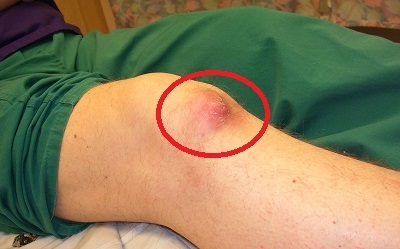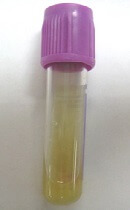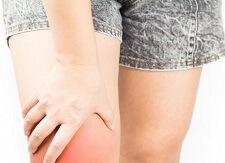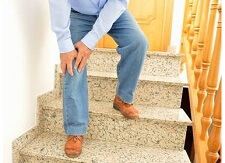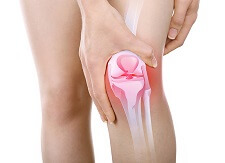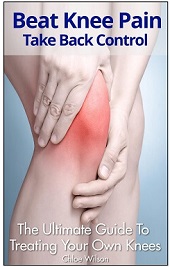- Home
- Common Knee Conditions
- Gout Knee
Gout Knee
Written By: Chloe Wilson, BSc(Hons) Physiotherapy
Reviewed by: KPE Medical Review Board
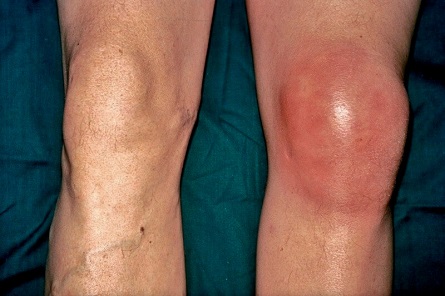
Gout knee is an inflammatory condition characterised by intense pain and swelling of the knee joint.
Gout is a fairly common condition affecting approximately 1-2 people in every 100, affecting one million Americans each year.
Men are 2-3 times more likely to be affected than women and the peak age of incidence is 75. Gout is often extremely painful and recurrent episodes are common.
As well as affecting the knee, gout can also affect the big toe, hands, toes, ankles and wrists. It tends to only affect one joint at a time rather than being widespread.
If the knee suddenly becomes hot, painful, red and swollen, it is most likely due to Gout Knee.
Here, we will look at the common causes, knee gout symptoms and treatment, diagnosis & prevention of gout knee, and you can even find out about famous gout sufferers! You can also check out our Gout Knee FAQ's to see what questions other people are asking.
What Causes Gout Knee?
Gout knee pain is caused by high levels of uric acid, aka urate, in the blood.
Uric acid is a waste product of many food sources. It normally passes out in our urine, but with gout knee there is a problem with how the body metabolizes, or breaks down, the uric acid.
This can either lead to:
- the kidneys not passing urate quickly enough - 90% of cases
- the body produces too much urate - causing less than 10% of cases
If the level of uric acid is too high, crystals can form in your soft tissues, usually around one joint such as the knee, resulting in gout.
The crystals cause an inflammatory response in the tissues leading to hot, swollen, red and painful joints.
The crystals tend to form at cool temperatures, which is why gout is so common in the hands and feet.
Uric acid levels are often raised for a number of years before gout knee symptoms develop.
Risk Factors For Gout

Some people are more susceptible to gout than others and there is often little correlation between the levels of uric acid in the blood and knee gout symptoms.
In fact, approximately 50% of people with gout do NOT have hyperuricemia, high uric acid levels.
There are a number of other factors that increase your risk of developing gout knee pain:
- Genetics: there is thought to be a genetic link in
about 20% of cases of gout
- Age: gout most commonly affects people over 40 with the peak
incidence at 75
- Obesity: especially with rapid weight gain. A BMI greater than 35 increases the risk of developing gout three times
- Diet: accounts for approximately 12% of cases of gout knee. Risk factors include excessive alcohol intake
especially binge drinking, fructose-based drinks and seafood
- Medical Conditions: Kidney disease and/or metabolism problems
- Drug Treatments: most
commonly diuretics (known as water tablets) used to treat high blood pressure,
heart failure and oedema
- Trauma: gout knee may develop after an injury or surgery
Gout knee can develop any time after puberty, although in women, it tends to be after the menopause. This is thought to be due to the positive effect of oestrogen until then.
Common Gout Knee Symptoms
The symptoms of gout knee will vary from person to person and may fluctuate.
In most cases, the symptoms of gout in knee develop rapidly over a few hours, usually at night or in the early morning.
Common gout knee symptoms include:
- Pain & Swelling: The knee joint quickly becomes hot, swollen and red and usually becomes extremely sore, particularly when moving the joint
- Night-Time Onset: Gout knee symptoms usually start at night due to lower body temperatures
- Skin Changes: the skin around the knee joint often looks shiny, red and stretched due to the swelling and inflammation
- Fever: Sometimes, gout results in a raised body temperature
- Limited Movement: swelling and pain from gout knee can restrict the knee's range of motion making it hard to bend or straighten the joint
- Reduced Function: Gout knee often makes weight-bearing activities such as walking and going up and down stairs incredibly painful
- Firm Lump: There may be a hard, visible lump in the knee from clusters of uric acid crystals known as tophi
Gout Knee Pain Diagnosis
Your doctor can normally diagnose gout knee by from what you tell him about your symptoms and your history such as any risk factors or previous episodes.
He can confirm the diagnosis of gout by doing blood tests, although these can be unreliable, or by removing a small amount of fluid from the knee joint, known as aspiration.
The fluid is examined under a microscope, looking for the presence of excessive uric acid crystals. Kidney function tests may also be done to confirm the diagnosis of gout knee.
Gout knee is a common cause of swelling in front of the knee but there are some other conditions that can too - check out the front knee swelling section.
Knee Gout Treatment
Left untreated, gout knee episodes usually settle in a couple of weeks but they can last longer. There are a number of things you can do to help speed up the healing process and prevent further attacks of gout.
#CommissionsEarned from Amazon on qualifying purchases
Gout knee treatment usually involves:
- NSAIDS: Non-steroidal anti-inflammatory medications such as ibuprofen/Advil can work really well if taken as soon as gout symptoms develop NB always check with your doctor before taking any new medications
- Rest: If you are suffering from gout in your knee, it is important to rest. Ideally you want to elevate your leg to help reduce swelling, leg cushions can really help, and avoid strenuous activity, e.g. limit weight bearing activities
- Steroids: Steroids, either taken orally or via an injection, can help to reduce the inflammation and pain associated with gout knee
- Supplements: Many people find that taking supplements help to dramatically reduce both the frequency and intensity of flare-ups of gout. There are a number of different varieties on the market - find out more about gout supplements, how they work and which ones work best
- Colchicine Medicine: Colchicine helps reduce the build-up of urate but can cause sickness and diarrhoea
- Ice: Using ice to cool down the joint can help reduce gout pain and swelling. Find out how to safely and effectively use ice for gout knee and visit the ice wraps section for the best ways to apply ice.
Gout Knee Recovery Time
A common question with gout in knee is how long does it last? Most cases of gout knee are acute, sudden and short-lived. Left untreated, most episodes of gout knee settle down after a couple of weeks.
Unfortunately, repeat episodes are common and most people will suffer a recurrence of gout knee pain anywhere from 6 months to 2 years later. 60% of gout sufferers will have a recurrence within 1 year.
During the remission periods, people with gout knee may have no symptoms or experience only minimal discomfort. However, gout is a chronic condition and, without proper management, the frequency and intensity of gout attacks can increase over time.
Are The Any Possible Complications?
Sometimes, gout spreads from the knee and affects more than one joint at a time, such as the big toe or hands.
There is also a risk of the uric acid causing crystals to form in the kidneys which can lead to inflammation, scarring and kidney stones.
Gout Prevention
There are a number of things you can do to help with gout prevention. The incidence of gout has doubled over the last 20 years. This is thought to be due to the increase in life expectancy, dietary changes and an increase in gout-associated diseases.
The best ways to reduce your risk of gout knee are to:
- Avoid Excessive Alcohol Intake: alcohol can increase urate levels especially beer, stout and fortified wines
- Lose Excessive Weight: obese people are more likely to suffer from gout - discuss weight loss with your doctor
- Avoid Fructose-Sweetened Drinks: such as soda
- Avoid Purine Rich Food: e.g. oily fish, offal, pulses and certain vegetables e.g. asparagus and spinach. This advice has been around a long time, but some more recent studies are now questioning this
- See your Doctor: Get your doctor to review your regular medications in case
any of them may be predisposing you to gout. For example, Allopurinol inhibits the formation of urate,
probenecid increases its excretion by the kidneys
- Supplements: There are a number of different supplements on the market that claim to lower uric acid levels and many gout sufferers swear by them. One study showed that an intake of 1,500mg per
day of Vitamin C decreases the risk of gout by 45%. Always check with your doctor before
starting any gout supplements >
- Drink Plenty of Water: to prevent dehydration. Aim for approximately 1.2 litres daily
Famous Gout Sufferers
Fascinating fact time! I thought you might like to find out about some fellow gout sufferers:

- Henry VIII: His love of fine food and wine was most likely his undoing
- Dick Cheney: Was hospitalised for side effects of medications he was taking for a foot ailment
- Jared Leto: This young actor developed gout after having to pile on the pounds for his role as John Lennon's killer in Chapter 27
- Ansel Adams: The famous photographer had problems lugging his photography equipment around due to gout
- Maurice Cheeks: Former NBA player & coach developed gout in his 40's and said he had "never experience pain like it as an athlete" Source: AARP Article
What Else Can Help?
People typically have a lot of questions about Gout Knee and how best to manage and prevent flare-ups.
We've compiled a list of commonly asked questions and answers, such as "What foods get rid of gout?" and "What happens if gout goes untreated?" - check out our article Gout Knee: Your Questions Answers
There are other conditions that cause knee pain at night, but whilst gout knee pain is not particularly common, it should always be considered with any sudden incidence of knee pain associated with swelling and redness.
You might also be interested in the following articles:
- Front Knee Swelling
- Front Knee Pain
- Side Knee Pain
- Pain Behind The Knee
- Burning Knee Pain
- Knee Pain On Stairs
- Knee Pain & Popping
- Swollen Knee Treatment
Related Articles
References
1. Gout: An Old Disease In New Perspective - G. Ragab, M. Elshahaly & T. Bardinc. Journal of Advanced Research, May 2017
2. Gout As Second Arthritis - S. Abedin. Arthritis Foundation
3. Gout & Pseudogout - B. Rothschild. Medscape, Jan 2019
4. Synovial fluid uric acid level aids diagnosis of gout - B. Vaidya, M. Bhochhibhoya and S. Nakarmi. Biomedical Reports, July 2018
5. Gout. NHS UK, August 2017
Page Last Updated: December 12th, 2024
Next Review Due: December 12th, 2026

